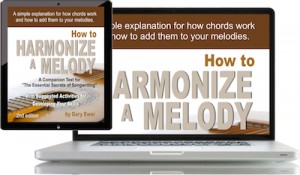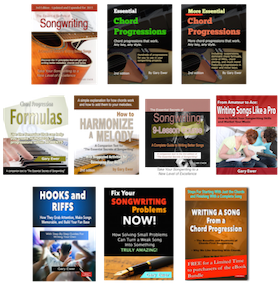You are more likely to hear the word “creativity” when talking about the arts than you are to hear the word “imagination.” We usually speak of creating — not imagining — something artistic. Nonetheless, when we do use both words, we tend to use them interchangeably; we think of someone’s creative abilities as being synonymous with their powers of imagination.
In fact, both words — creativity and imagination — play an important role in the making of art, whether that’s composing a song, painting a picture, choreographing a ballet, or writing a novel. And in the world of the arts, being imaginative is not necessarily the same thing as being creative.
It’s important to know the distinction, because both words play an important part in solving writer’s block. For songwriters, writer’s block usually starts as a problem with the imagination, and then moves quickly to a problem with creativity in general. Here’s how that works.
 Got a melody but don’t know how to add the right chords? “How to Harmonize a Melody” will show you, step by step — using sound samples — an easy and effective way to add chords that will make your melody stand up and get noticed! READ MORE..
Got a melody but don’t know how to add the right chords? “How to Harmonize a Melody” will show you, step by step — using sound samples — an easy and effective way to add chords that will make your melody stand up and get noticed! READ MORE..
How the Creative Process Gets Going
Songwriting usually starts with the imagining of a musical idea. More often than not, that idea winds up being a hook or a riff, something that the imagination conjures up. At this early stage, there’s often no thought given, in any precise way at least, to how this idea will figure into the entirety of the song. It’s simply an idea, one that you like, and one that’s hopefully going to play a role in the final version of your song.
That idea usually generates more ideas. In other words, you might imagine a chord progression, and immediately you tack on a rhythmic groove of some sort. The imagining of an idea like this generates a kind of excitement that we call inspiration, which makes it easier to generate more ideas.
At this point, you start putting your ideas together in a way that works, and that’s really the start of the creative part of the process. First you imagine, then you create.
If you don’t like how the ideas sound, or if a new idea just doesn’t work well with the one(s) you’ve already created, you toss that new idea and set about to generate more new ideas. As you work to put them together, good ideas are kept and bad ideas are thrown out. That’s a normal process, and it’s what songwriting is: imagining ideas, seeing how they work, tossing bad ones and keeping the ones you like.
Get Gary’s hardcopy book, “Beating Songwriter’s Block: Jump-Start Your Words and Music“, published by Backbeat Books
How Writer’s Block Happens
At some point, if you find yourself tossing many ideas to the point where you can’t seem to move forward, you feel frustration beginning to take hold. It seems that everything you’re imagining is simply not working.
That’s usually the beginning of a mild case of writer’s block, and that’s when it’s good to stop, have a cup of coffee or go for a walk. Mild writer’s block happen to everyone, and it’s not a cause for concern.
If, however, you find that this state of affairs — of being unable to move forward by imagining good ideas and then creating something pleasing with them — lasts for a week or so, your mild creative block has become a moderate one. This is also common, and most songwriters go through this as well. The best solutions to moderate writer’s block are:
- Reduce your writing workload. Work on writing short segments of songs rather than trying to commit to writing an entire song.
- Divide your songwriting sessions into smaller segments of time. Work for 5 or 10 minutes, and take lots of breaks.
- Listen to music. Listening can stimulate your imagination and help inspire you to imagine new and better ideas.
 For most songwriters — and this might be you right now — the problems that lead to writer’s block stem from an issue with the imagination: you’re not generating ideas that you like. You might think of the imagination as being like a pool of water from which you dip your creative ladle, as it were, to see what you come up with. Using that analogy, you might think that the pool is of a set depth, with no ability to increase its contents.
For most songwriters — and this might be you right now — the problems that lead to writer’s block stem from an issue with the imagination: you’re not generating ideas that you like. You might think of the imagination as being like a pool of water from which you dip your creative ladle, as it were, to see what you come up with. Using that analogy, you might think that the pool is of a set depth, with no ability to increase its contents.
But there are many ways to increase and stimulate your imagination. If you’re feeling particularly stunted and unable to imagine good songwriting ideas, try the following:
- Stay in contact with other songwriters. Talking to others and listening to their music is a great way to stimulate the imagination and make it more likely you’ll generate good ideas of your own.
- Involve yourself in other art forms. Go to the symphony, the ballet, or an art gallery. Read lots of books. Try writing short stories or sketching. Do anything that requires you to tap into different parts of your artistic imagination.
- As before, listen to lots of music. Listening gives you the opportunity to hear how other songwriters solve musical problems, and their solutions can often become your solutions.
 Written by Gary Ewer. Follow Gary on Twitter.
Written by Gary Ewer. Follow Gary on Twitter.
 Gary’s “The Essential Secrets of Songwriting” eBook Bundle takes you through every aspect of what good songwriting is. Improve the way you write your songs. And get today’s free offer: a copy of “Creative Chord Progressions“. READ MORE
Gary’s “The Essential Secrets of Songwriting” eBook Bundle takes you through every aspect of what good songwriting is. Improve the way you write your songs. And get today’s free offer: a copy of “Creative Chord Progressions“. READ MORE












This article has the best description of the songwriting process that I have ever read. Songwriters are often asked which comes first, the lyrics or the melody and there is sometimes no good “either/or” answer. To say that the song starts with imagination, which leads to a fragment, which, hopefully, leads to inspiration is a great general answer, as well being as accurate, at least as far as my process goes, but I would never have been able to put it into words. I plan to use this to answer the “chicken or egg” question in the future, citing you as the source.
I wanted to say that I have subscribed to the email for a long time and get a lot of value from it. I may go weeks without opening one of them, but then I might have time on a Sunday morning and read one or more and find just what I needed to keep going.
Thanks for the terrific site. I will share this article with my fellow members of the Songwriting Circle of the Twin Cities.
Many thanks, Patrick, for your comments – I very much appreciate them.
All the best with your songwriting projects!
-Gary